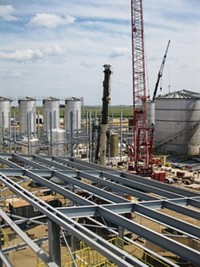Advertisement
Grab your lab coat. Let's get started
Welcome!
Welcome!
Create an account below to get 6 C&EN articles per month, receive newsletters and more - all free.
It seems this is your first time logging in online. Please enter the following information to continue.
As an ACS member you automatically get access to this site. All we need is few more details to create your reading experience.
Not you? Sign in with a different account.
Not you? Sign in with a different account.
ERROR 1
ERROR 1
ERROR 2
ERROR 2
ERROR 2
ERROR 2
ERROR 2
Password and Confirm password must match.
If you have an ACS member number, please enter it here so we can link this account to your membership. (optional)
ERROR 2
ACS values your privacy. By submitting your information, you are gaining access to C&EN and subscribing to our weekly newsletter. We use the information you provide to make your reading experience better, and we will never sell your data to third party members.
Energy
Congress Revisits Biofuels Mandate
Energy Policy: Lawmakers could revise Renewable Fuel Standard
by Glenn Hess
July 26, 2013
| A version of this story appeared in
Volume 91, Issue 30

Congress is unlikely to scrap a federal mandate that requires petroleum refiners to blend increasingly large amounts of biofuels—mainly ethanol and biodiesel—into U.S. gasoline and diesel supplies, lawmakers said last week.
But the Renewable Fuel Standard, established in 2005 to help reduce U.S. oil consumption, “cannot stand” in its current form, said Rep. Fred Upton (R-Mich.), chairman of the House of Representatives Energy & Commerce Committee, at the start of a two-day hearing on the program’s future. The petroleum industry argues that the standard will force it to exceed a safe ethanol mixture, while biofuels makers say repealing the requirement will ruin a huge investment in alternative fuels.
Rep. John M. Shimkus (R-Ill.) said there are not enough votes on the committee to repeal the standard, but a majority of members are willing to support some changes. He urged the leaders of the petroleum and biofuels industries to seek common ground. Otherwise, “nobody is going to be happy and nothing is going to get done,” Shimkus said.
The petroleum industry says with U.S. demand for gasoline falling, it is hitting a “blend wall” in which it can no longer mix in enough ethanol to meet the standards target without exceeding the current 10% ethanol in gasoline threshold, the maximum amount deemed safe for use in all car and truck engines.
“To avert this disaster, we call on the Administration to immediately waive the volume requirements and for Congress to finally repeal this fundamentally broken law,” Jack N. Gerard, president of the American Petroleum Institute, a trade group, told the committee.
But abolishing the standard would undermine investment in a new generation of alternative fuels produced from renewable sources like plants, algae, waste, animal fats, and other forms of biomass, said Michael McAdams, president of the Advanced Biofuels Association.
Acknowledging that setting renewable fuel blending obligations each year is problematic, McAdams said the government should lay out a longer-term framework. “A clear signal given to stakeholders in advance, with targets for 2014 and 2015, would be a huge step forward,” he remarked.



Join the conversation
Contact the reporter
Submit a Letter to the Editor for publication
Engage with us on Twitter